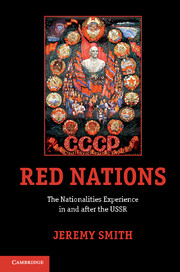Book contents
- Frontmatter
- Dedication
- Contents
- Tables
- Preface
- 1 Introduction: the prison-house of nations
- 2 Dispersal and reunion: revolution and civil war in the borderlands
- 3 Bolshevik nationality policies and the formation of the USSR: the Bolsheviks dispute national policy
- 4 Nation-building the Soviet way
- 5 Surviving the Stalinist onslaught, 1928–1941
- 6 The Great Patriotic War and after
- 7 Deportations
- 8 Territorial expansion and the Baltic exception
- 9 Destalinisation and the revival of the republics
- 10 Stability and national development: the Brezhnev years, 1964–1982
- 11 From reform to dissolution, 1982–1991
- 12 Nation-making in the post-Soviet states
- 13 The orphans of the Soviet Union: Chechnya, Nagorno Karabakh, Abkhazia, South Ossetia and Transdniester
- Conclusion
- Bibliography
- Index
- References
Preface
Published online by Cambridge University Press: 05 June 2014
- Frontmatter
- Dedication
- Contents
- Tables
- Preface
- 1 Introduction: the prison-house of nations
- 2 Dispersal and reunion: revolution and civil war in the borderlands
- 3 Bolshevik nationality policies and the formation of the USSR: the Bolsheviks dispute national policy
- 4 Nation-building the Soviet way
- 5 Surviving the Stalinist onslaught, 1928–1941
- 6 The Great Patriotic War and after
- 7 Deportations
- 8 Territorial expansion and the Baltic exception
- 9 Destalinisation and the revival of the republics
- 10 Stability and national development: the Brezhnev years, 1964–1982
- 11 From reform to dissolution, 1982–1991
- 12 Nation-making in the post-Soviet states
- 13 The orphans of the Soviet Union: Chechnya, Nagorno Karabakh, Abkhazia, South Ossetia and Transdniester
- Conclusion
- Bibliography
- Index
- References
Summary
In a perceptive article published in 1981, Radio Free Europe’s Jaan Pennar wrote: ‘It would seem, on the basis of the evidence on hand, that the Soviet Union is currently somewhat short on nationality policy.’ What Pennar understood more clearly than many of his contemporaries was that the national federal structure of the USSR, while ultimately derived from early Soviet policies, had for a long time ceased to provide the framework for implementing any coherent approach to the reconciliation of national differences with the Marxist-Leninist ideology of the Soviet state. Equally inadequate was a characterisation of the Soviet Union as a russifying regime intent on destroying those national differences – the survival and flourishing of national languages and cultures under the official patronage of the union republics in the late Soviet period provided sufficient evidence against such a characterisation, even if this was not always apparent to outside observers in the early 1980s. In reality, the last meaningful debates on Soviet nationality policy took place in 1924. What followed over the next sixty-seven years was a series of individual pronouncements and actions, ranging from the banal to the brutal, which at some times followed identifiable patterns or trends, but at other times were purely ad hoc and improvised responses to particular pressures. This ‘shortage of nationality policy’ is one of the considerations that has led me to write a book about the Soviet nationalities experience, rather than Soviet nationalities policies, which has been the focus of much of my earlier work. The policies of the Soviet government, both broad ones and specific ones, undoubtedly impacted on the lives of non-Russians and are a part of this narrative, but I have tried to recount something more than that. Leaders in the Soviet republics and post-Soviet states, cultural figures and, at key moments, the broad population have also shaped the way the nationalities have developed and how they experienced Soviet and post-Soviet rule. In describing the nationalities experience I hope to have captured in general brushstrokes some of the cumulative effects of a combination of factors.
Information
- Type
- Chapter
- Information
- Red NationsThe Nationalities Experience in and after the USSR, pp. ix - xxPublisher: Cambridge University PressPrint publication year: 2013
